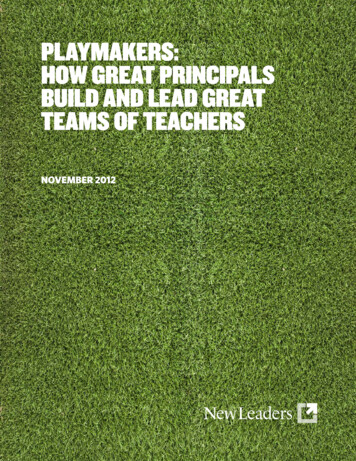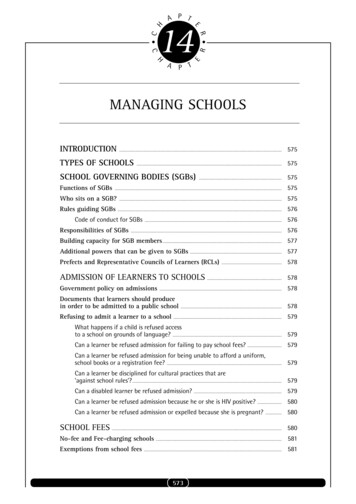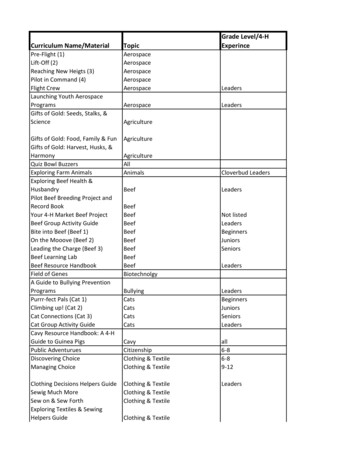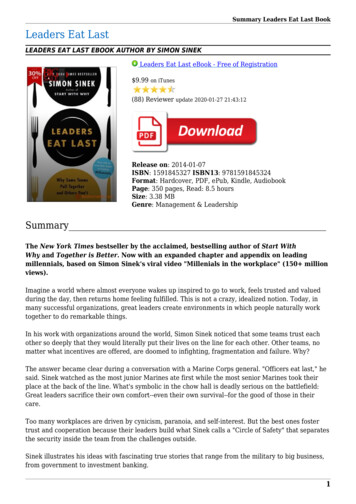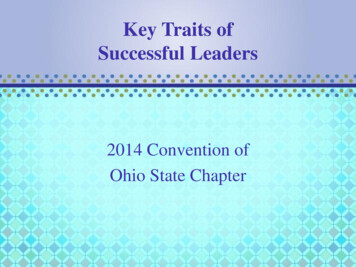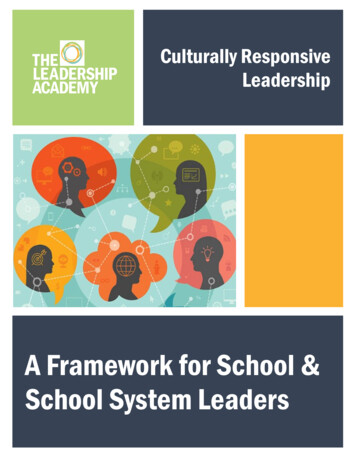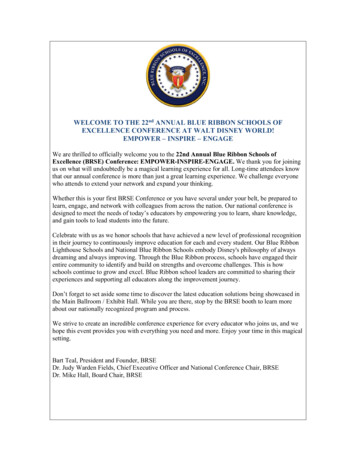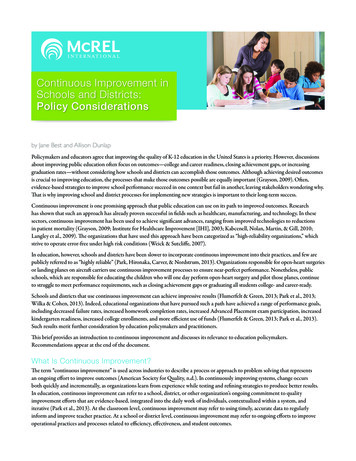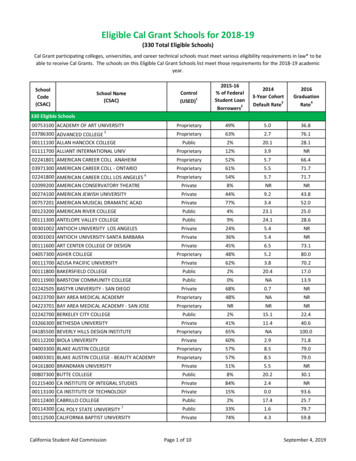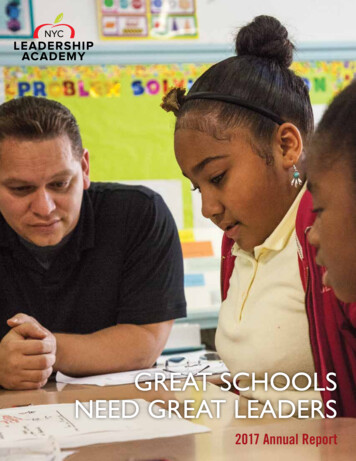
Transcription
GREAT SCHOOLSNEED GREAT LEADERS2017 Annual Report
Table of ContentsLetter from our Board Chairpg.4Message from our President & CEOpg.5Impact at a Glance pg.6We envision a nation where every school and school system is led bytransformational leaders who prepare all children, especially the traditionallyunderserved, for success.We build the capacity of educational leaders, at every level of the system,to confront inequities and create the conditions necessary for all students to thrive.Expanding our Reach pg.7Supporting States pg.8Strengthening School Systems pg.9Helping School Leaders Growpg.10In the News pg.12Financial Highlights pg.13Donors and Partners pg.14Board of Directors and Executive Leadershippg.15Organized under the laws of New York State as a not-for-profit corporation, the NYC Leadership Academy is exempt from tax under Section 501 (3) of the Internal Revenue Code andis governed by an independent and non-salaried Board of Directors. The NYC Leadership Academy qualifies for the maximum charitable contribution deduction by donors. A summary ofactivities and financial highlights for the Fiscal Year ending June 30, 2017, is described in this report.WWW.NYCLEADERSHIPACADEMY.ORG3
We now have worked with more than 150 school systems in 32 states.Our mission of training great leaders who can lead great schools,including by confronting the many inequities in our education system,remains paramount.”– Jonathan Moses, Board Chair, NYC Leadership AcademyFifteen years ago, the Leadership Academy began the critical work of buildinga leadership pipeline for New York City public schools. We knew that schoolscouldn’t be great without great leaders. We are extraordinarily proud of what weaccomplished working with the New York City Department of Education. Ourgroundbreaking Aspiring Principal Programs trained more than 550 principalswho have served in some of the City’s most challenging schools. And, we helpedthe Department of Education build its own leadership training program.For 15 years, the NYC Leadership Academy has carried the banner of high quality schoolleadership, leveraging the incredible experience of our staff, many of them former schooland school system leaders, to provide direct support and build the capacity of districts.We have strengthened educational leadership in more than 150 school systems in 32states and internationally.I am pleased to introduce this report which serves as a reminder of where we havebeen and a signal of where we are going. In 2017, we took bold steps to expand ourwork at the nexus of leadership and equity, where we know great leadership must liveto improve learning for students, especially in our most underserved and underresourced communities.In the meantime, our work outside New York City has grown. Seeing our successhere in New York, school systems across the country started calling asking forhelp in developing their own leadership pipelines.The result is that we havetaken the lessons we learned in New York throughout the country. We nowhave worked with more than 150 school systems in 32 states. Our mission of training great leaders whocan lead great schools, including by confronting the many inequities in our education system, remainsparamount. And, our own work has only improved as we engage with so many diverse communities.Thisreport is particularly meaningful as it marks the first year of our strategic plan, Leadership Academy 2020,by which we will seek to strengthen our ability to realize our mission and set the stage for responsiblefuture growth.We pushed our growth as a national organization with a continued focus on creating innovative learningopportunities for school leaders and preparing them for the many challenges facing education in the 21stCentury. We also named two retired leading superintendents credited with achieving significant studentgains as the Leadership Academy’s inaugural “superintendents in residence.” In this role, Ann Clark andValeria Silva are key advisors to provide practical advice and insights to educators about infusing equityinto leadership practices.While we take great pride in how we have helped educators throughout the United States take on thechallenges of school leadership, we know we have only scratched the surface. As we look ahead to 2018,we embrace the opportunity to continue working with district, charter, and private schools in urban andrural areas across the country.I look ahead to 2018 and beyond with excitement.Your support and commitment have helped to get ushere and will take us into the future.None of this would be possible without the dedication and support of our team of educators and otherprofessionals whose drive for ensuring that all children have great schools defines the Leadership Academy,as well as our board members, funders, alumni, and partners. I am grateful to you and privileged to serveas the Leadership Academy’s Chair of the Board of Directors.As we work toward the goals articulated in our three-year strategic plan, Leadership Academy 2020,we eagerly anticipate new levels of recognition as thought leaders, advocating for policies that supportprofessional learning and development.This work is urgent. The time is now. Our children cannot wait.In gratitude for your support,Irma ZardoyaPresident & CEOWe look forward to partnering with you on this work that will shape the next generation.Sincerely,Jonathan MosesBoard Chair4NYC LEADERSHIP ACADEMY Annual ReportIn 2017, we took bold steps to expand our work at the nexus ofleadership and equity, where we know great leadership must live toimprove learning for students, especially in our most underservedand under resourced communities.”– Irma Zardoya, President & CEOWWW.NYCLEADERSHIPACADEMY.ORG5
AlaskaEXPANDING OUR ADCMONCTNNMSCALGATXFLWhere we worked in 2017Where else we’ve worked since 200399%OF PARTICIPANTSLIKELY TO RECOMMENDTRAINING FROMTHE LEADERSHIPACADEMY23 States110 School Systems100%OF PARTICIPANTSWERE INSPIRED TOHAVE MEANINGFULCONVERSATIONS WITHCOLLEAGUES IN THEIRSCHOOLSGRADUATED THE14TH COHORT OF THELEADERSHIP ACADEMY’SFLAGSHIP ASPIRINGPRINCIPALS PROGRAM,TOTALING562 ALUMNISINCE 2003203 System Leaders646 School LeadersNearly 1,000 school and system leadersMore than 2 MILLION students reached6NYC LEADERSHIP ACADEMY Annual ReportWWW.NYCLEADERSHIPACADEMY.ORG7
We are excited about the partnership between the Nevada Department of Educationand NYC Leadership Academy. Their collaboration in the past and their long-standingreputation in delivering this evidence-based professional development will bringstrategies, best-practices, resources and support that these school leaders havenever been offered before.”– Steve Canavero, Ph.D., Nevada Superintendent of Public InstructionHILLSBOROUGH COUNTY, FLORIDAHillsborough County Public Schools made ahistoric move by adopting a district-wide racialequity policy to identify and address the rootcauses of racial disparities in student learning.Recognizing school leadership as a critical lever for improving schoolperformance and student outcomes, the Nevada Department ofEducation has engaged the Leadership Academy to develop andsupport a statewide network of principals.Over the next two years, we will facilitate a community of150 educational leaders from 10 districts, improving theirskills and capacity to: support and coach their teachers conduct productive learning walks that identifyinstructional challenges in classrooms and address them inways that improve teaching create strong school leadership teamsIn the first year, Leadership Academy facilitators will providein-person and online learning sessions for Nevada principals.In the second year, we will train state education leaders tofacilitate sessions and provide on-going support for theprincipal network.The district leaders knew implementing this policy would notbe easy, so they contracted with the Leadership Academy tosupport its 28 senior staff and board members in examiningdistrict policies and goals through an equity lens and havingproductive conversations about race.Beginning this year, Leadership Academy facilitators led schoolboard members in reflecting on their own racial histories andthe impact implicit biases have in schools.They discussed howto champion the district equity policy, and developed succinctways to talk about the policy with community members. Ourteam also worked with district senior staff to begin defining theconditions needed to implement racial equity plans connectedto the district policy.We also developed an equity learning walk tool for areasuperintendents or principal supervisors to use to betteridentify and address inequities during classroom observations.Usually when you talk about equity and diversity, people have an idea of what thatmeans. But when it comes to moving academic achievement, principals needthe resources to know what equity looks like on a daily basis. NYC LeadershipAcademy is helping district leaders provide this support to principals so that theycan create school cultures that are conducive to learning for all students.”– Minerva Spanner-Morrow, Chief Diversity Officer, Hillsborough County Public Schools8NYC LEADERSHIP ACADEMY Annual ReportWWW.NYCLEADERSHIPACADEMY.ORG9
“What I learned in Foundations has been very impactful on helping us increasestudent learning. The chance to tap into the vast experience and knowledge of mymore seasoned peers was invaluable. I think back on many of the discussions as I domy work today.”– Peggy Goodman, Assistant Superintendent, Gwinnett County Public SchoolsFOUNDATIONS OF PRINCIPAL SUPERVISIONLEXINGTON, SOUTH CAROLINAWhen Dr. Gregory Little became superintendent, he realized hewould be losing a number of principals in the coming years, andthe district lacked a leadership pipeline to fill those critical jobs.He engaged the Leadership Academy to help create a districtbased Aspiring Principals Academy. In the summer of 2017, thefirst cohort of eight aspiring principals completed a three-weeksummer intensive, and are currently in a year-long residency topractice and reflect on leadership activities in a school setting.A few months into the aspiring principals program, Mary Gaskins,the district’s Director of Professional Learning, reported, “Theaspiring principals are now more aware of their own mentalmodels as well as those of others.They are more prepared toview things through the lens of equity, they have expanded theirdefinition of data, and they are thinking about intended andunintended consequences.“Those eight people alone will have a huge impact onour district.”Based on this early success, the Lexington School District Oneis deepening its work with the Leadership Academy. We areworking with 33 district staff members to define leadership roles,identify the leadership standards associated with each role, andto support opportunities for staff to meet these standards. Weare also delivering professional development for district leaderson equity, collaboration, and team work.When she and her colleagues attended the LeadershipAcademy’s inaugural Foundations of Principal Supervisionprogram, Peggy Goodman had just become AssistantSuperintendent of Gwinnett County Public Schools. She hopedto learn to ground her thinking and practice in the LeadershipAcademy’s research-based district leadership standards.The year-long program, which aims to improve principalsupervision and support, helped her reflect on what herrole should look like and how she and her team would worktogether to support principals and improve schools.Three years later, Goodman credits the Foundations trainingwith helping her and her team members improve lowperforming schools in the district. She has been better ableto debrief with principals after classroom observations, offeruseful tools, and support principals in developing strategies forimproving student learning.Over three years, the Foundationsprogram has supported 56 principalsupervisors from 21 districts across 12states. Those supervisors have in turnreached more than 700 principals, andclose to 400,000 students.HELPING SCHOOL LEADERS GROWWith our coaching funded by the Booth FerrisFoundation, some New York City principals putin place innovative solutions to better engagestudents who were struggling and missing school.They expanded professional learning communitiesfor teachers and created mentoring and artsprograms for young men of color. In a shortamount of time, students’ grades and attendanceimproved, discipline incidents dropped, and fewerteachers left at the end of the year.10NYC LEADERSHIP ACADEMY Annual ReportPRINCIPAL DORIS LEE: “I knew there was a gap in7TH GRADE ENGLISH TEACHER: “I had always run a strictPRINCIPAL KIM SWANSON: “I think for a lot of these kids;understanding between the cultures of the kids and theteachers, not only by race, but also by economic level and bybackground.We had to build relationships with kids.Teachersstarted reading articles about student behavior and teacherexpectations in urban schools.They discussed skin color,culture, upbringing, views on how children should behave andwhether they should be seen and not heard.We were asking,‘What are your expectations for our kids and how do theyalign with the kids’ culture?”classroom. My attitude was, ‘It’s my way and that’s it.’ I realizedthey may be sitting there compliant with me, but they’renot enjoying it or engaged in anything I’m doing.You can’tmotivate a child by talking down to them. Now my studentsfeel comfortable saying to me, ‘I think you’re being unfair rightnow,’ and we can compromise, or I can explain the rationalebehind my decisions so that they understand why I am askingthem to do something. It’s no longer me telling them to dosomething just because I said so.”their mentor is somebody who is checking on them whena lot of other people have written them off.The mentorsare men who look like them, have had similar experiencesto them, and are open to speaking to them about thoseexperiences.”11TH GRADE STUDENT: “If our mentors could change to getto be who they are now, I can do the same thing. I startedthinking, ‘If I change my ways, I can be something instead ofbeing a statistic.’ So, I just started acting different.”WWW.NYCLEADERSHIPACADEMY.ORG11
We urge states to launch initiatives that will produce principals and districtleaders who can lead for equity and access. Only then will all students have ashot at getting the best academic experience to prepare them for graduationand beyond. And only then will we, as a nation, have a shot at leveling the playingfield and ending educational inequities."– Irma Zardoya, President & CEO, in Education WeekWe acknowledge the generous financial support of foundations, corporations, and individuals during the2016-2017 fiscal year. On behalf of all who benefit from the leadership investment of our donors, we say thankyou as we invite your continued engagement with, and support of the NYC Leadership Academy.REVENUEEXPENSES14% 1,379,435MANAGEMENT & GENERAL19% 1,900,000With all our exciting work and programs in 2017, the Leadership Academy was featured in major media outlets.We also shared our expertise on leadership and equity on our new blog, Leadership Insights, in white papers, andat conferences, including AASA, the Principal Supervisor Summit, the NASSP's National Principal's Conferenceand the Coalition of Community Charter Schools Symposium.3% 302,003CONTRIBUTIONSFUNDRAISING81% 8,225,85083% 8,279,603PROGRAM SERVICESPROGRAM SERVICESTOTAL REVENUE: 10,125,850TOTAL EXPENSES: 9,961,041Our auditors have expressed an unqualified opinion on our June 30, 2017, and 2016 financial statements.A printed copy may be obtained from NYC Leadership Academy.1. We advocated for public funding tosupport school leadership and provideprofessional learning on equity.2. W e have been recognized for thesuccess of our equity training forprincipals.13. We published a guide on coachingprincipals to lead strong teams.PowerinNumbers24. W e advised leaders on the importanceof ongoing professional learning forconfronting racial inequities in schools.Coaching principalsto build teams thattransform schoolsBy Nancy Gutierrez and Jill Grossmanwww.nycleadershipacademy.org5. We shared how school leaders cansupport undocumented students.3@NYCLeadership4512– Chief Diversity Officer Minerva Spanner-MorrowNYC LEADERSHIP ACADEMY Annual ReportCELEBRATING THE LEADERSHIP ACADEMYWe had a remarkable celebration to honor our 14 yearsof supporting educational leaders in June at the New-YorkHistorical Society.We were joined by Schools Chancellor Carmen Farina, formerSchools Chancellor Joel Klein, and New York State Board ofRegents members Kathleen Cashin, Judith Chin, and LesterYoung; hundreds of graduates of our Aspiring Principals andLeadership Advancement programs; and coached principals,donors, and leaders in education. Klein and foundingLeadership Academy Board Member Sy Sternberg recalledwhen public and private entities, corporations, non-profitgroups, and foundations invested 80 million to create theLeadership Academy. Led by Kathy Wylde, the Partnership forNYC raised more than a third of that.The Wallace Foundationwas another leading funder.Said Klein, being a great educational leader “is about how todeal with human beings, understand budget, deal with parents,set high expectations.The Leadership Academy is about allof that.”Declaring June 14 “NYC Leadership Academy Day,” Mayor Billde Blasio’s office issued a proclamation stating,“NYCLA is animportant partner in ourefforts to run our schoolson the twin engines ofequity and excellence.”Said Chancellor Farina,“Asa former principal, I knowhow rewarding, challenging,and important the work of leading a school is. I congratulatethe Leadership Academy for its tremendous work to prepareand support great school leaders.”We were proud to hear from principals we have supported.Alumni speaker Wanda Vazquez, principal of El Puente Academyin Brooklyn, inspired us, saying,“I am here to highlight thepotential for power within this room. Our work as educationalleaders calls on us to create the conditions that will prepareour young people for college, careers, life, and liberation.”We also premiered our short film,The Power of Leaders,featuring the voices of nearly a dozen New York City studentstalking about the impact their principals have had on their lives.The film features APP graduates Vazquez, Dr. Reggie Landeauof George J. Ryan Middle School 216, and Seung Yu of Academyfor Software Engineering.WWW.NYCLEADERSHIPACADEMY.ORG13
American Express, in partnership with the National Association of Secondary School Principals Pathto Leadership program, generously supported expansion of our flagship Aspiring Principals Programsin two of New York State’s largest school districts, Rochester City School District and Yonkers PublicSchools. The 600,000 grant is enabling the development of a new pipeline of principals with strongpreparation and support services to advance student achievement.A grant of 250,000 from the Booth Ferris Foundation expanded the Leadership Academy’s AlumniNetwork and galvanized participants to be change agents around educational equity. Funding supportedour Mini-Grant Program for Equity and Excellence at Village Academy (Far Rockaway, Queens), LifeSciences Secondary School (Harlem, NY), and Bronx High School for Writing and Communication Arts(Bronx, NY) that transformed academic, social experiences, and outcomes for boys and young menof color.The Carnegie Corporation of New York philanthropic foundation’s 1.3 million grant was an extensionof previous generous funding that developed a Virtual Learning Platform and expanded our systemicfocus on equity, diversity, and social justice. The grant will leverage technology to develop innovativeonline and blended learning services and tools for school and system leaders. Two additional grantstotalling 400,000 helped develop our Virtual Learning Platform and further strengthen capacity througha strategic planning process.Board of DirectorsMr. Jonathan Moses(Chair)PartnerWachtell, Lipton, Rosen & KatzDr. Louise MirrerPresident and Chief Executive OfficerNew-York Historical SocietyMr. Donald F. DonahuePresident and CEO (retired)The Depository Trust & Clearing CorporationMr. Reginald RichardsonPrincipalNew Rochelle High SchoolMr. Peter A. FlahertyManaging DirectorArcon PartnersMs. Evelyn RodsteinConsultantEvelyn Rodstein AssociatesMs. Katherine Bibb HubbardFounder & PresidentLearning HeroesMr. Sy SternbergRetired Chairman and CEONew York Life Insurance CompanyMr. Eric W. KahnPartnerBryan Cave LLPMr. Scott WidmeyerChairmanWidmeyer CommunicationsIrma ZardoyaPresident and Chief Executive OfficerNYC Leadership AcademyAn Investing in Innovation (i3) grant totaling 3 million from the United States Department of Educationlaunched the Leadership Academy’s Teaming Model in 2014. We have prepared and supported teams ofhighly qualified school leaders for success in some of New York City’s most challenging schools, havingan impact on 30,000 students annually. Funding also supports a partnership with the RAND Corporationfor an extensive study of the Teaming Model.Executive LeadershipWe are grateful for ongoing support from and partnership with The Wallace Foundation. The Foundationawarded two grants totalling 400,000 to develop a Virtual Learning Platform and complete a strategicIrma Zardoya,President and CEOMichelle Jarney,Vice President, Leadership Coaching Servicesplan that charts an extended course for our growth. Working collaboratively, we have been engaged infacilitating the Foundation’s Principal Pipeline Initiative to help six urban school districts develop amuch larger corps of effective school principals in high need schools as well as the PrincipalMary Jo Dunnington,Senior Vice President, Client EngagementKathleen Nadurak,Executive Vice PresidentMarlene Filewich,Vice President, School Leadership ProgramsKarim Parchment,Chief Financial OfficerNancy Gutierrez,Chief Strategy OfficerMary Rice-Boothe,Vice President, District Leadership SupportSupervisor Initiative, which supports 14 districts in improving the effectiveness of the administratorswho oversee principals.We have also been working with the Wallace Foundation to convene teams from 10 states for the ESSALeadership Learning Community (ELLC). The ELLC in partnership with CCSSO, Council of Great CitySchools and the National Urban League, has provided valuable opportunities for states to learn fromand support one another as they develop their federal ESSA plans focusing on leading for equity andespecially in support of turnaround schools.14NYC LEADERSHIP ACADEMY Annual ReportWWW.NYCLEADERSHIPACADEMY.ORG15
CONNECT WITH US Facebook.com/nycleadershipacademy Linkedin.com/company/nycleadershipacademy @NYCLeadership45-18 Court Square Long Island City, NY 11101 718-752-7365 www.nycleadershipacademy.org 2017 NYC Leadership AcademyAll rights reserved.
The district leaders knew implementing this policy would not be easy, so they contracted with the Leadership Academy to support its 28 senior staff and board members in examining district policies and goals through an equity lens and having productive conversations about race. Beginning this year, Leadership Academy facilitators led school

